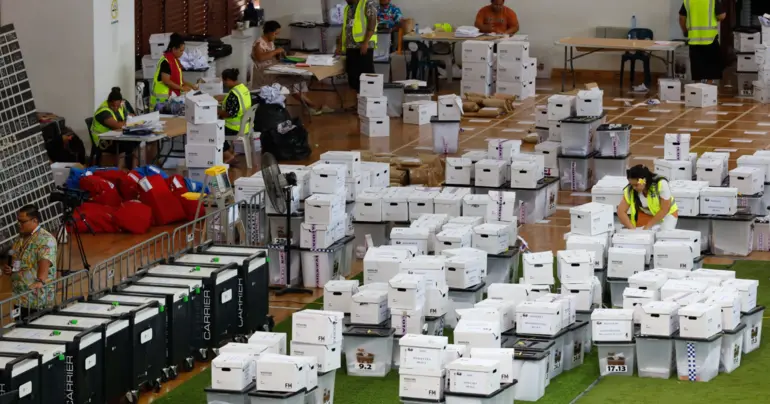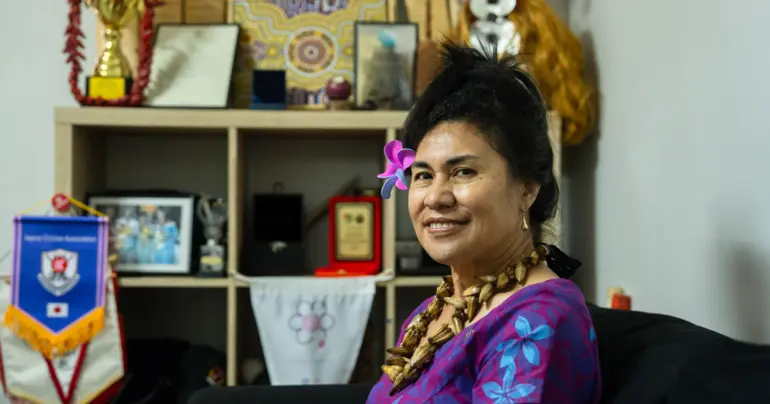Swearing in “unconstitutional”: A-G
 By Joyetter Feagaimaali'i
•
25 May 2021, 10:20AM
By Joyetter Feagaimaali'i
•
25 May 2021, 10:20AM
The Attorney General Savalenoa Mareva Betham-Savalenoa has deemed a Faatuatua ile Atua Samoa ua Tasi (F.A.S.T.) party swearing-in ceremony in Mulinu’u on Monday “unconstitutional”.
She also warned that all people involved in the proceedings would be subject to civil and criminal prosecution.
“The public is advised that the F.A.S.T. held ceremony swearing-in elected Members on 24th May 2021, in and around 5pm at the footsteps of Parliament building at Mulinu’u is unconstitutional," Savalenoa said in a statement.
However, elected F.A.S.T. Prime Minister Fiame Naomi Mata’afa maintains the swearing-in was lawful and based on the principle of necessity requiring the nation's constitution be upheld.
According to Savalenoa, neither the Head of State, his Highness Tuimalealiifano Vaaletoa Sualauvi II, nor the Council of Deputies' member, Lemamea Ropati Mualia - who have the authority to swear in the Legislative Assembly - were present.
“The Chief Justice his Honour Satiu Simativa Perese was also not present," she said.
“None of these constitutional authorities were present nor undertook any official roles under the Constitution and the Standing Orders of Parliament.
“The so-called officials who conducted the unlawful F.A.S.T. swearing-in ceremony are not the relevant authorised officials and therefore have no legal authority to conduct such a ceremony.
“Therefore, the swearing in ceremony by F.A.S.T. is unlawful and unconstitutional. All persons involved in these unlawful proceedings are subject to civil and criminal prosecution under the law."
A second press release by the Attorney General clarified the powers of the Head of State in terms of swearing the Speaker and Members of Parliament; and the powers of the caretaker Speaker of the Legislative Assembly.
“The Speaker before he or she assumes the duties of the Speaker must be sworn in by the Head of State: (see Article 49 (2) of the Constitution)," said the Attorney General.
“The Speaker then swears in the Member of Parliament: (see Article 61 of the Constitution).
“The Council of Deputies may take over the role of Head of State but only in the circumstances where the Head of State is incapacitated or absent (not in the Samoa): (see Article 23 (2) of the Constitution).
“However, the Chief Justice may take over the duties of the Council of Deputies, if no Council of Deputies has been elected: (see proviso to Article 25 (1) of the Constitution.)
“Those circumstances have not occurred. The Head of State is neither incapacitated nor absent; and there is an elected Council Deputies, present.
“In terms of the Speaker of the Legislative Assembly and his powers after dissolution of Parliament, he retains all his powers as Speaker until a new Speaker is sworn in: (see section 30 of the Legislative Assembly Powers and Privileges Ordinance 1960 (the ‘Ordinance’).
“The actions of the Speaker, in the exercise of his or her power, are not subject to the jurisdiction of the Court: (see section 31 of the Ordinance.) Those powers include the authority to grant, or refuse, entry to the Chambers or Precinct of the Legislative Assembly: (see sections 14 and 15 of the Ordinance).
“Chamber” is defined to mean ‘a place in which the Legislative Assembly sits in session for the transaction of business.’ Whereas “Precinct” refers to accommodation for strangers, members of the public, media- to name a few; and the entire building in which the Chamber of the Assembly: (see section 2 of the Ordinance.”
According to the Attorney General’s office Standing Order 191(1)(e)) says that any attempts by any other persons to conduct a swearing-in of any Member of the Legislative Assembly is unlawful and unconstitutional.
 By Joyetter Feagaimaali'i
•
25 May 2021, 10:20AM
By Joyetter Feagaimaali'i
•
25 May 2021, 10:20AM











